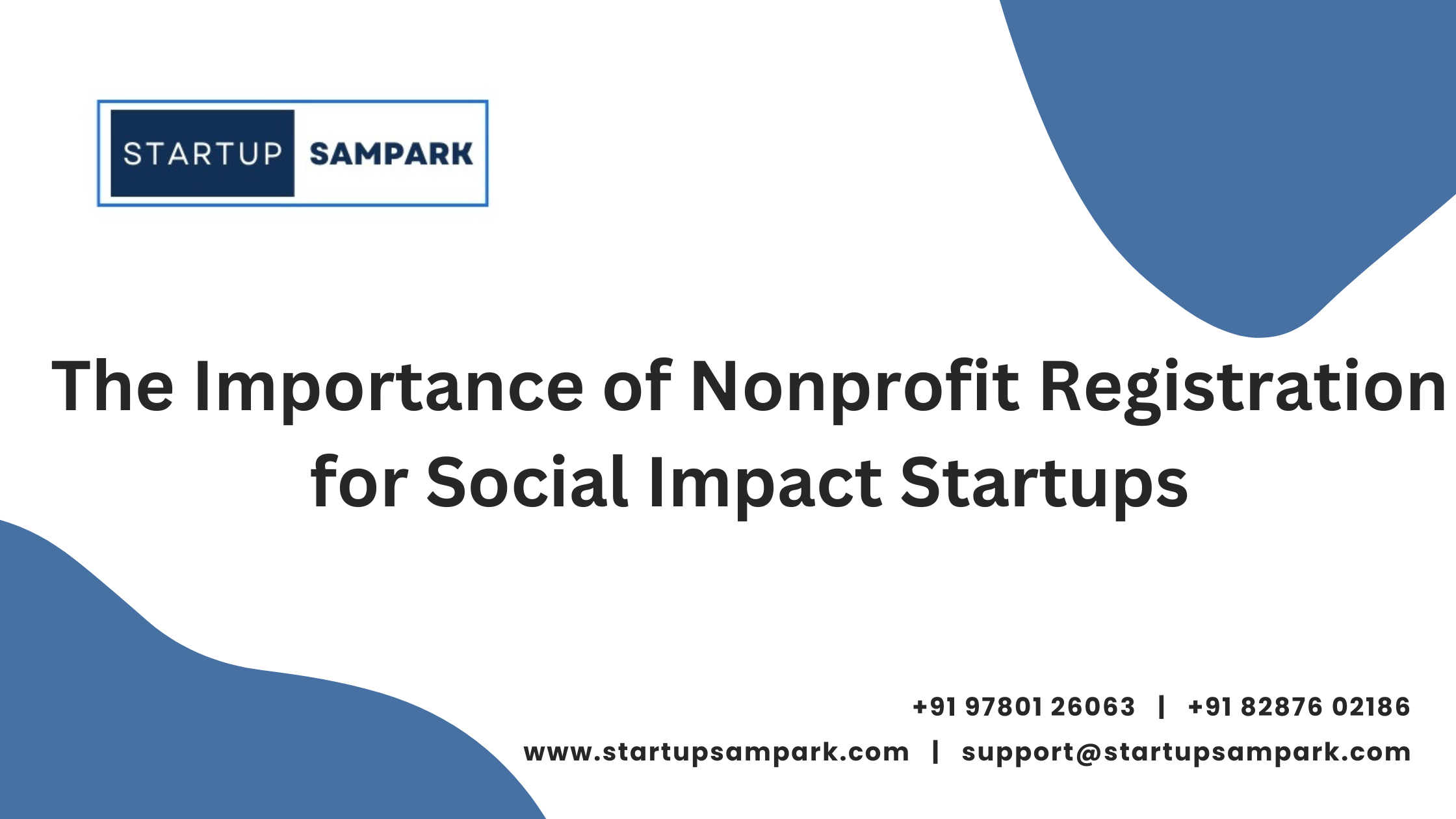The Importance of Nonprofit Registration for Social Impact Startups
The Foundation of a Social Impact Startup
Nonprofit registration is a critical step for any social impact startup in India, as it ensures legal recognition, transparency, and accountability. A social impact startup is often driven by a mission to address societal challenges and improve the community, whether through education, healthcare, poverty alleviation, environmental conservation, or other areas. While these goals are noble, without proper legal registration, the startup may face challenges in gaining credibility, securing funding, and operating effectively. Registering as a nonprofit not only brings legitimacy but also provides a legal framework that supports the startup’s mission and ensures compliance with government regulations.
Legal Recognition and Credibility
One of the most significant benefits of nonprofit registration is the legal recognition it provides. In India, registering as a nonprofit organization (whether as a trust, society, or Section 8 company) ensures that the organization is recognized by the government and other stakeholders. This official status is crucial for establishing credibility with potential donors, partners, and stakeholders, as it assures them that the organization operates within the legal boundaries of Indian law. Legal registration also boosts public trust, as it demonstrates that the organization is committed to transparency, proper governance, and accountability in its operations.
-
 Startup Registration (DPIIT Recognition)₹8,850.00
Startup Registration (DPIIT Recognition)₹8,850.00
Access to Funding and Donations
Nonprofit registration plays a pivotal role in attracting funding and donations from various sources, including government schemes, international donors, corporate social responsibility (CSR) funds, and individual philanthropists. Registered nonprofits are eligible for tax exemptions under the Income Tax Act, which allows donors to claim deductions for their contributions. This makes your nonprofit more attractive to potential donors who are looking to make tax-efficient contributions. Additionally, nonprofits registered under schemes like FCRA (Foreign Contribution Regulation Act) can accept foreign funding, which is crucial for organizations with a broader social mission.
Without proper registration, a social impact startup may struggle to secure funding, as many donors, investors, and philanthropic organizations require nonprofit status as a prerequisite for funding. Furthermore, government grants and CSR partnerships often target legally registered organizations, and failing to register may exclude the startup from these valuable funding opportunities.
Governance and Accountability
Proper nonprofit registration establishes a clear governance structure that is essential for the effective management of the organization. This structure ensures that decision-making is transparent, with a defined set of rules and responsibilities. In the case of a Section 8 company, this involves a board of directors overseeing the nonprofit’s activities and finances, while societies and trusts require governing bodies or trustees. Such formal governance mechanisms help maintain accountability, ensuring that the nonprofit adheres to its mission and avoids misuse of funds.
Moreover, registered nonprofits are required to file annual returns and maintain financial records that can be audited. This adds another layer of accountability, which not only fosters internal trust but also makes the organization more attractive to external stakeholders. For startups aiming to create a social impact, good governance practices are essential for long-term success and sustainability.
Eligibility for Government Schemes and Tax Benefits
India’s government offers several schemes and incentives for registered nonprofits, aimed at promoting social welfare, environmental sustainability, and community development. These include various grants, subsidies, and tax exemptions that can significantly reduce the financial burden on a social impact startup. For example, nonprofit organizations in India are eligible for exemptions on income generated through activities related to their charitable purpose, making it easier to reinvest profits into furthering their social mission.
Additionally, nonprofit registration opens up opportunities for collaboration with government agencies, making it easier to implement government-backed initiatives. Many government programs, such as Startup India, provide support to nonprofits through financial assistance, capacity-building programs, and access to networks that can help scale operations. For a social impact startup focused on community development or public welfare, this access to government resources can be a game-changer.
Long-Term Sustainability and Growth
Nonprofit registration is not just about immediate benefits; it also lays the foundation for long-term sustainability and growth. A legally recognized nonprofit can build a brand, gain public trust, and attract loyal supporters, all of which are essential for creating lasting social impact. Registration provides a platform for expansion, as it ensures that the startup meets legal standards for operating across different states in India or even internationally.
Furthermore, nonprofit registration facilitates partnerships with other organizations, both for-profit and nonprofit, to scale social initiatives. It can also help establish a track record of compliance and achievement that can attract government support, funding, and recognition. This long-term stability is crucial for nonprofits aiming to create meaningful, lasting change in society. By following the right legal processes and ensuring proper registration, social impact startups can increase their chances of long-term success while creating significant positive change for the communities they serve.
Startup,India
-
 Startup Registration (DPIIT Recognition)₹8,850.00
Startup Registration (DPIIT Recognition)₹8,850.00














Post Comment